Business & Management
EfD-Uganda Stakeholders Co-Creation Workshop Discusses Clean Energy Solutions for Small Holder Farmers
Published
2 years agoon
By
Jane Anyango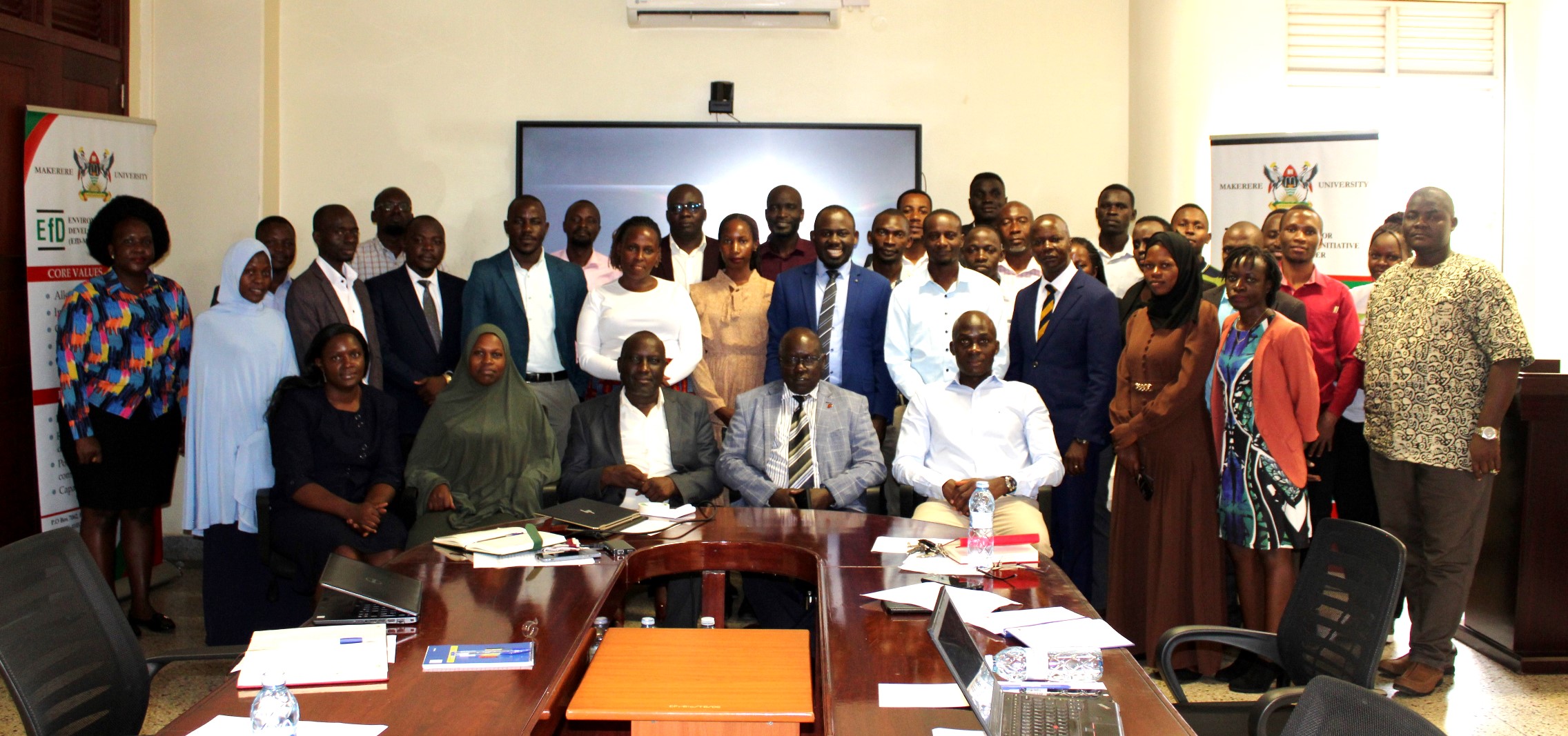
Members of the academia and EfD research fellows on 25th April, 2024 held a co-creation workshop with representatives from government ministries, civil society organization and the private sector to generate a context-relevant Micro, Small and Medium Enterprise (MSMEs)-led model for supporting the transition to low-carbon ag-tech by smallholder farmers.
The EfD in collaboration with Partnership for Economic Policy (PEP) embarked on the study titled, “Clean Energy For Development: A Call For Action (CEDCA): Renewable Energy MSMEs operating to modernize agriculture in Sub-Saharan Africa and South-East Asia: Barriers, opportunities, and implications for an inclusive low carbon transition”
The project funded by the International Development Research Centre (IDRC) is being implemented in four countries namely; Burkina Faso, Kenya, Uganda, and Vietnam.
The EfD-Uganda project team is composed of Prof. Edward Bbaale, who is also centre Director, Dr. Aisha Nanyiti Lecturer, School of Economics, Dr. Florence Lwiza, Lecturer, School of Agricultural Sciences and Gyaviira Ssewankambo, Junior Research Fellow.
The objectives of the study were to establish the barriers and opportunities for the emergence of a vibrant MSME sector to support the use of modern energy technologies in agriculture for inclusion of women and youth in the ag-tech MSMEs value chains and to undertake rigorous tests of context-relevant models to support the transition to low-carbon agricultural technologies.
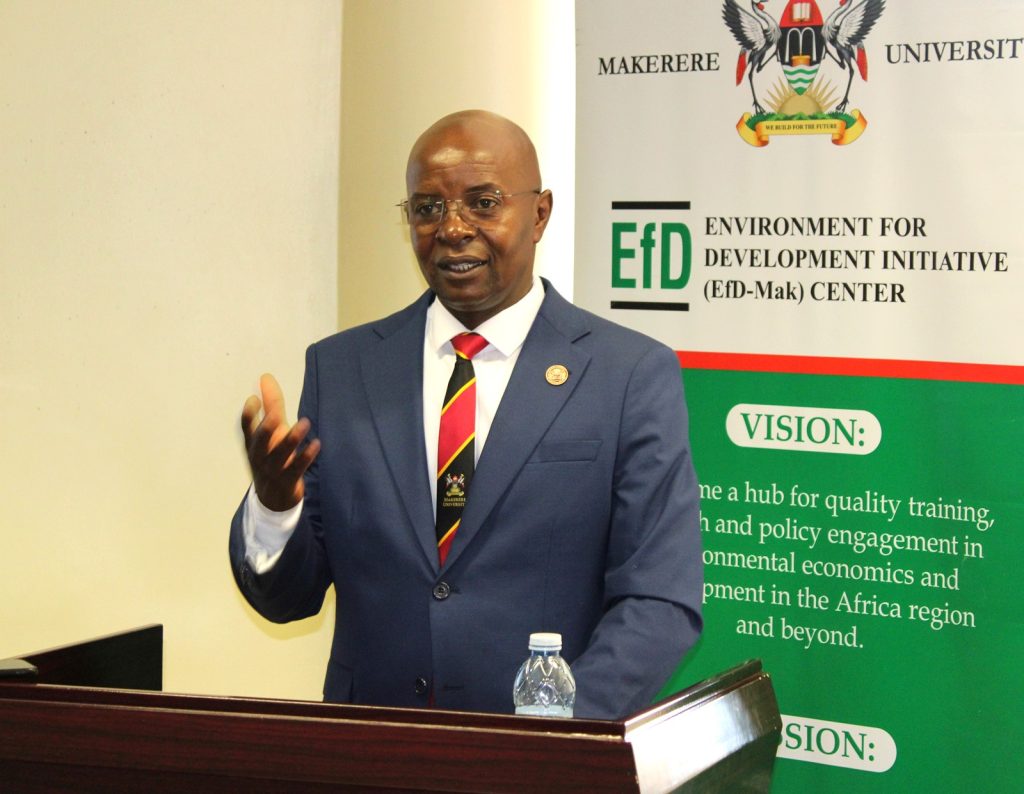
The study undertook a three phased approach namely the Diagnostic, Design and Test phases.
The Diagnostic phase whose findings were presented by Dr. Lwiza Florence sought to understand the state of affairs on the supply side and the demand side of the renewable ag-tech industry in Uganda. Among other things, the diagnostic phase sought to establish the type of ag-technologies supplied by the renewable ag-tech industry, the scale of supply-side players, State of women, youth, and other groups involvement on the ag-tech supply side, the type of ag-technologies demanded and needed by the farmers, the state of women, youth, and other groups involvement on the ag-tech demand side, barriers to up-take of low-carbon ag-techs and opportunities for supporting the emergence of a dynamic MSME-led transition to the use of low-carbon ag-techs.
The Test phase will involve rigorous impact evaluation of an MSME-led model.
In the Design phase, a Co-creation workshop with MSMEs and Stakeholders had a plenary session to generate a context-relevant MSMEs-led model for supporting the transition to low-carbon ag-tech by smallholder farmers.
Participants joined in a discussion on renewable energy projects in their organizations and their experiences with low-carbon ag-techs like solar or hybrid water pumps, batteries, generators, driers, fridges, and millers.
The research team also sought the stakeholders’ opinion about the effectiveness of sensitization programs in advancing the uptake of modern ag-technologies, their opinion of a fairly feasible MSMEs-led model for enhancing smallholder farmers, women, and youth uptake of modern ag-technologies plus any feedback or questions to the research team.
The workshop was officially opened and closed by the Director Directorate of Graduate Research and Training Prof. Edward Bbaale who is also Director EfD-Uganda. Bbaale emphasized the contribution of stakeholders a key to the project success.
“If we must do research that will change our society, then it is you, colleagues, that must work with us. If you don’t agree to work with us, then we shall be developing solutions and developing policy recommendations that will not actually serve the purpose.
And because of that, then we count on you continuously to work together, to craft together, to co-create together so that we can be on the point. We need to work together so that the results that we get and the recommendations can be usable by you, can be acceptable by you, and then in so doing we shall change our society and experience the true socio-economic transformation,” Bbaale stressed that in trying to understand many of the intricate aspects of the society and economy, the centres key focus is to work with stakeholders in government, the private sector and other non-public entities.
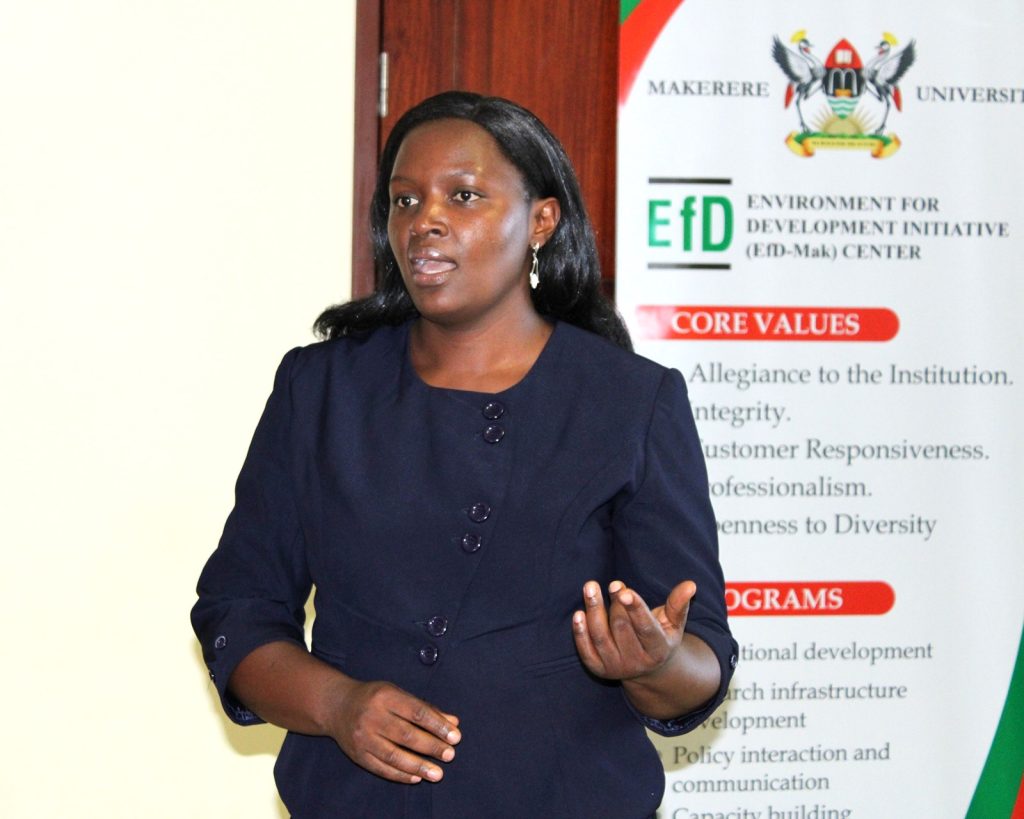
He stated that the issue of green transitions is a global question being approached from different aspects where energy and low carbon solutions occupy a very important space. Commending Government of Uganda for different initiatives promoting use of clean energy, Bbaale expressed the need for agriculturalists and those in the value chain to use renewable energy for production, processing, value addition and marketing.
“So if we are to transit, we must get a solution in terms of energy. We must get a solution for the energy at home, in the workplaces, in the industries and we must get a solution for the energy in the transport sector” he added and appreciated participants for the exchange of ideas especially the number of ideas on what other people are doing as far as SME energy solutions are concerned. He assured participants that in doing research, the center and university are open to ideas, and so was the reason for this workshop.
Makerere University, as an institution, Bbaale explained, is focused to becoming a research-led and innovation-driven institution. And because of that, he added Makerere is looking at research that interrogates into the different technologies and research that lead to new innovations.
“And I want to say that the type of work that we are doing in this research is about the energy solutions as they exist in the small and medium enterprises. And as a result, we are right in connection with you, stakeholders, in an attempt to address the problems that our society faces.”
It is now well known that the world is transiting, but now through the transition to low carbon solutions, research is at the core of what we are, what we must do and where we must go. The country is relying on us”, the professor said.
The approach to research he added is building with colleagues, through collaborations, making sure that the policy actors, the researchers from Makerere, people from government ministries SMEs, civil society, the private sector and others come together to craft a solution that is workable in the real world today.
Presenting the study overview Dr. Aisha Nanyiti explained that Climate change poses significant risks to farming households around the world but the risk is higher for SSA with about 600 million people living in severe energy poverty.
Households, according to Nanyiti, have limited potential to cope with climate risks. While not among the big emitters, Uganda’s climate action contributes to global climate efforts, and reduces the country’s vulnerability to spatial climate change effects, given the limited coping potential.
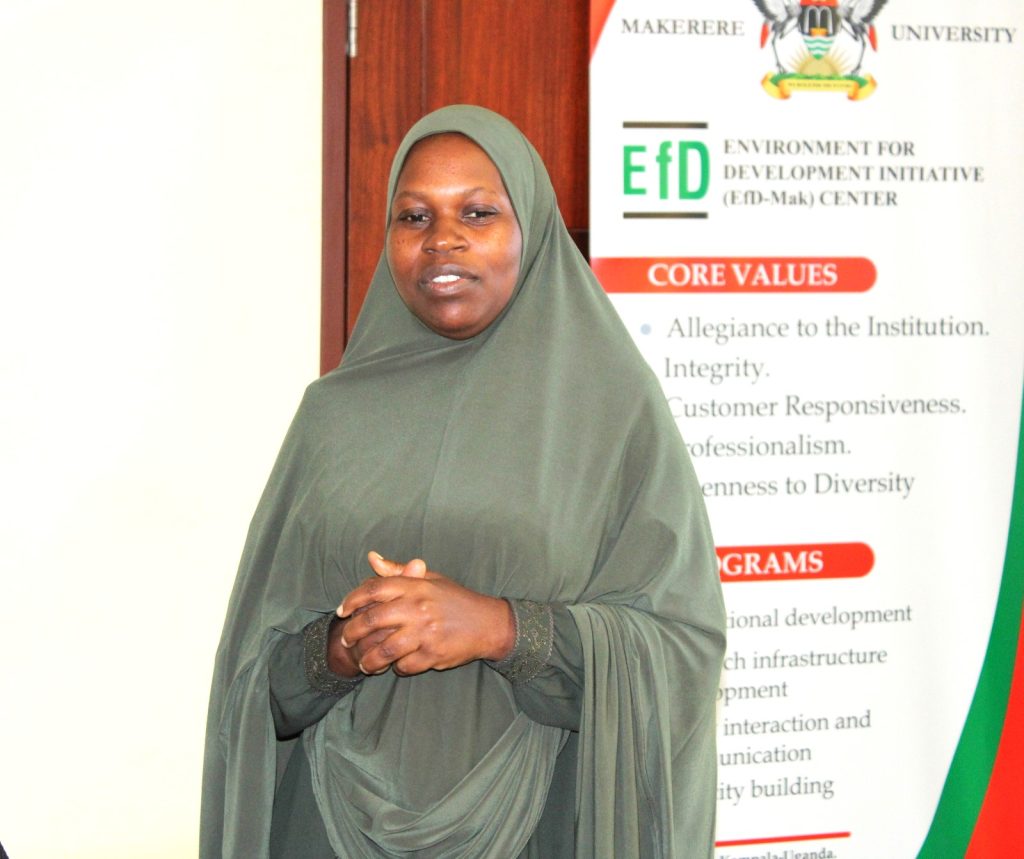
“Uganda’s agricultural sector contributes highest to its emissions and accounts for 53.3% of the GHG emissions. Low-carbon agricultural energy technologies are hence an indispensable fragment of Uganda’s energy transition.
However, the uptake of these technologies is low. Lack of access, affordability, knowledge of alternatives, and financing are cited as the key barriers to uptake”, Nanyiti said.
Dr. Nanyiti further explained that MSMEs can play a central role in driving the uptake of low-carbon ag – technologies. The highest proportion of Uganda’s MSMEs she reported are engaged in the agricultural sector with high potential for involvement of women and youth, potential adopters of ag-tech, and distribution of ag-tech, through innovative business models.
Participants appreciate the project, ready for further engagements
Key outputs from the stakeholders engagement included agitation for sensitization, relating the project to government initiatives and existing legal framework, scaling up the project, learning from other countries what they have done, the need for heavy polluters to pay more, use of carbon credits as incentives to SMEs using clean energy, targeting real users of clean energy and standardization of products to eliminate counterfeits.
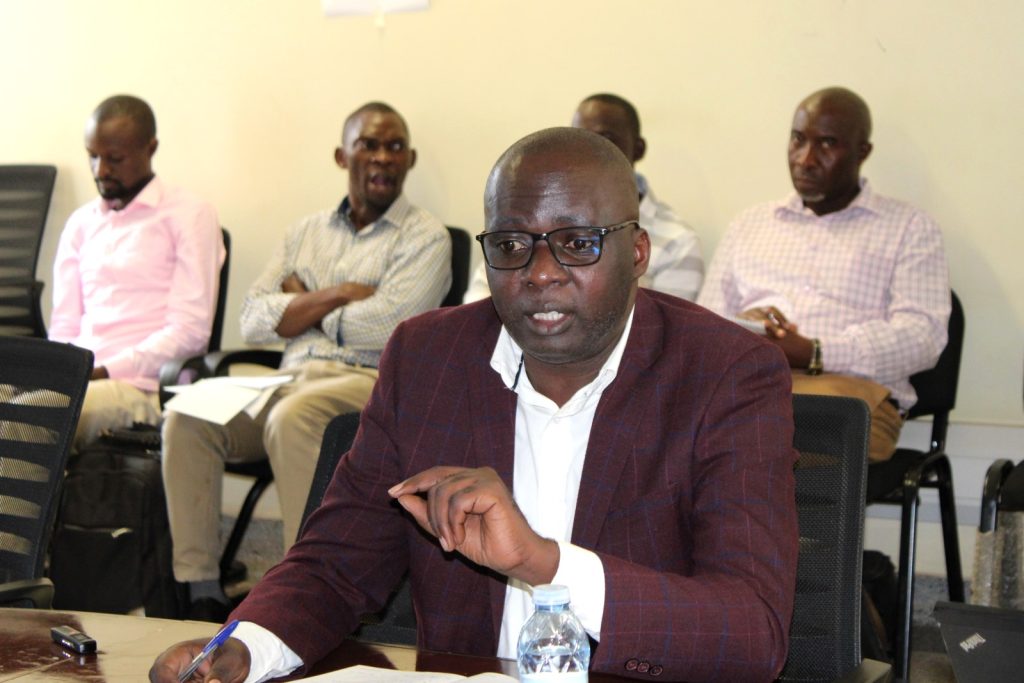
Representing the Assistant commissioner Ministry of Water and Environment Nathan Mununuzi also Senior Environmental Officer, appreciated the project and expressed the need to look at government initiatives in regard to promoting clean energy to safe guard the environment and increasing agriculture productivity.
“I really appreciate so far what has been presented. These are real facts on the ground, and we look forward to further engagements. So far you’ve engaged the MSMEs, but you’ve not had the story of what initiatives government is putting in place in regard to that subject”.
He highlighted some of the government projects including the Uganda Intergovernmental Fiscal Transfer that is supporting farmers with irrigation technologies and promoting solar powered irrigation schemes. Another one is the wetland restoration project engaging and encouraging farmers to voluntarily leave the wetlands, but give alternatives to grow high-value crops and fish ponds on the fringes of the wetlands and a green fund which can support some of those initiatives.
Representing the Commissioner Ministry of Energy and Mineral Development, Micheal Ahimbisibwe a Senior Energy Officer, hailed the project team and implored them to consider numbers and percentages.
“I’m happy with the study myself and I would be very glad to read the detailed report. This was a summary and the summary usually doesn’t give a lot”.
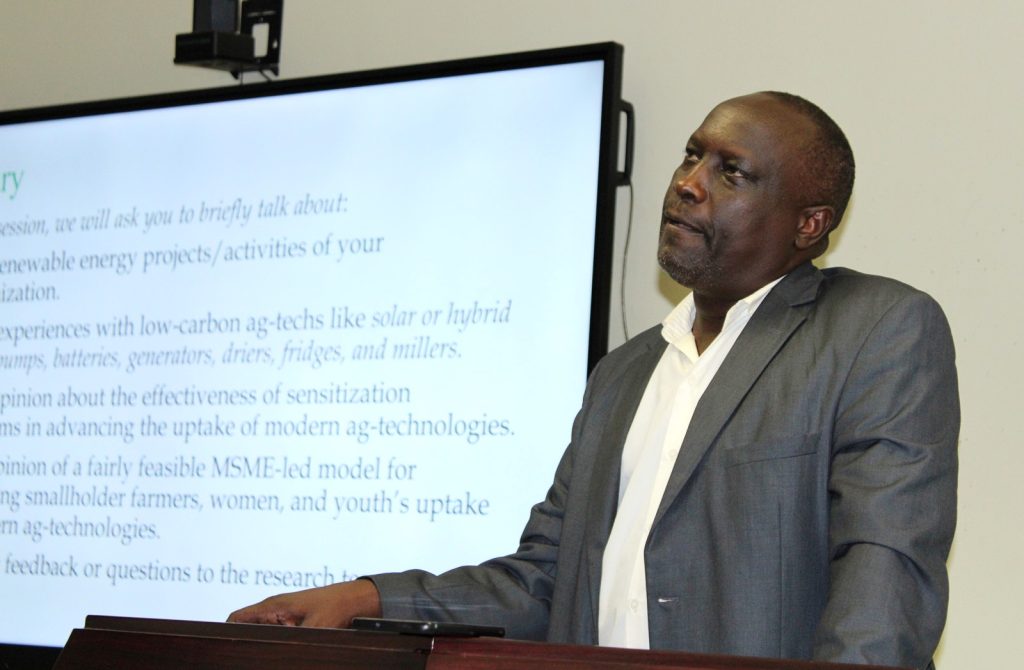
Most of your observations were in terms of, more people agreeing to this, less people agreeing to this. It would do more in terms of percentages and numbers, so that it gives a very good comparison. Because more can be 70, can be 100. And then I think you also concentrated on a few technologies, mainly solar. There are many more technologies out there which are very helpful to agriculture sector than solar itself. Of course, everybody, when we talk about renewable, many people understand solar quickly because that’s what has been flushed into everybody’s mind.
Then there’s also the issue of the life cycle analysis. When we are deploying renewable energy it would be actually also important in value addition. When you are harvesting, you may need energy for harvesting. And I want to see you touching on that part”.
Ahimbisibwe clarified that the ministry designed a project that is supposed help the farmers and the companies have access to affordable financing, which will help them to deploy further and wider. The financing is structured in a way that the company which is dealing in renewable products can access the financing to expand their product line as well as the market range.
With established office countrywide this financing enables famers and SMES, get the renewable energy equipment that they would wish to have and pay back in small installments.
The other drawback was the research concentration in Kampala area, Wakiso and Entebbe which he argued do not have a lot of agricultural hinterland and therefore the agricultural inputs for which these companies are targeting to give out may not be so big. If the research team went out beyond this area, Ahimbisibwe reasoned, there’s more agriculture taking place there which can help the companies to sell much.
Ahimbisibwe reported that recently, government launched a free connections policy and got funding from World Bank to actualize that connection to anybody who is near an electricity pole and has never been connected but is willing.
“You can go and ask in your neighboring office to be connected, or even tell your friends and neighbors because the funding is available. What we are looking for are the people to be connected. But you must get your house wired properly for a connection to take place. But it is a free connection. If you are near a pole or you need one pole to your house, you can use that opportunity.”
And since this is an agricultural symposium, Ahimbisibwe explained it is linked to energy with a component of clean cooking. Uganda according to Ahimbisibwe is highly dependent on biomass for cooking and the Ministry is trying to advocate for alternatives to biomass by making sure that biomass is used sustainably, but also deploying other alternatives into the market such as LPG, ethanol and electricity for cooking.
Assistant Commissioner for Agribusiness in the Ministry of Agriculture Animal Industry and Fisheries Yusuf Ogwang said the use of clean energy is a worldwide initiative which is also being emphasized by government ministries, agencies and departments covering the whole value chain from production to marketing.
Ogwang noted because most of the technologies come from the National Research Organisation, the ministry was encouraging the private sector to produce some of these technologies, that are user-friendly by the farmers, and also that are clean energy.
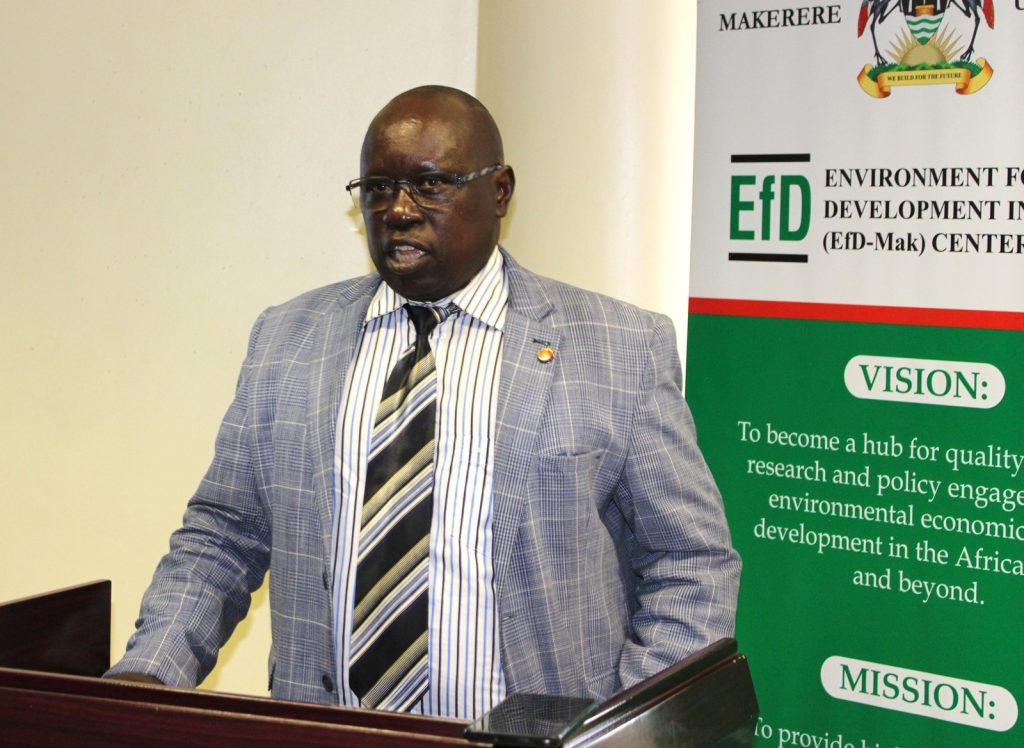
The ministry he said implemented the agricultural transit development project, in production, encouraging farmers in many irrigation sites on the use of solar, renewable energy.
The ministry he added has zoned our agriculture and within each zone there is a center for demonstration picking up and most of the people are using solar for irrigation.
“And also in value addition, we discourage our farmers to use generators. Internationally it is not allowed. So we encourage them to use hydro power and also solar, clean energies. And this has picked up. This project supported so many farmers engaging in production, value addition and packaging”
He reported that government has a big project which is related to this one- the Uganda Climate Smart Agricultural Transformation Project covering about 70 districts all over the country. He called on the EfD researchers to join hands.
“… we should work together because there are so many things that you are doing here that we can borrow from you, and there are so many things that we are doing that you can borrow from us. Because this project is covering the whole value chain, animal, crops, animal stock, livestock, crops, and fisheries. Discovering all those value chains”.
The commissioner added that the ministry is now employing officers that have techniques in soil and land management. The project he said developed climate smart practices in coffee, plantations, and has five enterprises namely rice, beans, coffee, maize, and then cassava discouraging environmental degradation, in the whole value chain, from production up to marketing.
“In addition, the project is going to cover the whole areas of livestock, fisheries, and crop. So I think you are spot on. The only thing I want to emphasize is let’s work together. I think there’s a missing link. There are so many things we can do together so that we develop our farmers.”
Ogwang also appreciated the project presentations.
“I really like the presentation from my sister, Florence. Dr. Florence, you really put everything on the ground. Well put all those challenges, those are the real issues that are affecting our farmers. And then the recommendations, I was very happy with it”
Presentation on the Project overview and Diagnostic phase findings attached.
Jane Anyango is the Communication Officer EfD Uganda
You may like
-


Call for Applications: Diploma Holders under Government Sponsorship 2026/2027
-
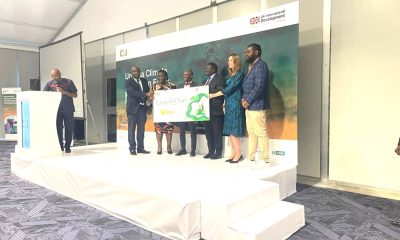

Makerere University Researchers Awarded UCIF Grant to Tackle Maize Contamination with Innovative Plant-Based Fungicide
-


Makerere Graduation Underscores Investment in Africa’s Public Health Capacity
-


Botswana Delegation Visits Makerere’s Public Investment Management Centre to Study Sustainable Training Model
-
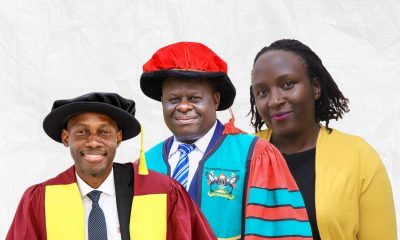

Three MakSPH Faculty Honoured with Makerere University Research Excellence Awards 2026
-


Makerere University commemorates 13 transformative years of partnership with Mastercard Foundation
Business & Management
Thirty Public Officers Certified in Integrated Regulatory Cost-Benefit Analysis
Published
2 days agoon
March 3, 2026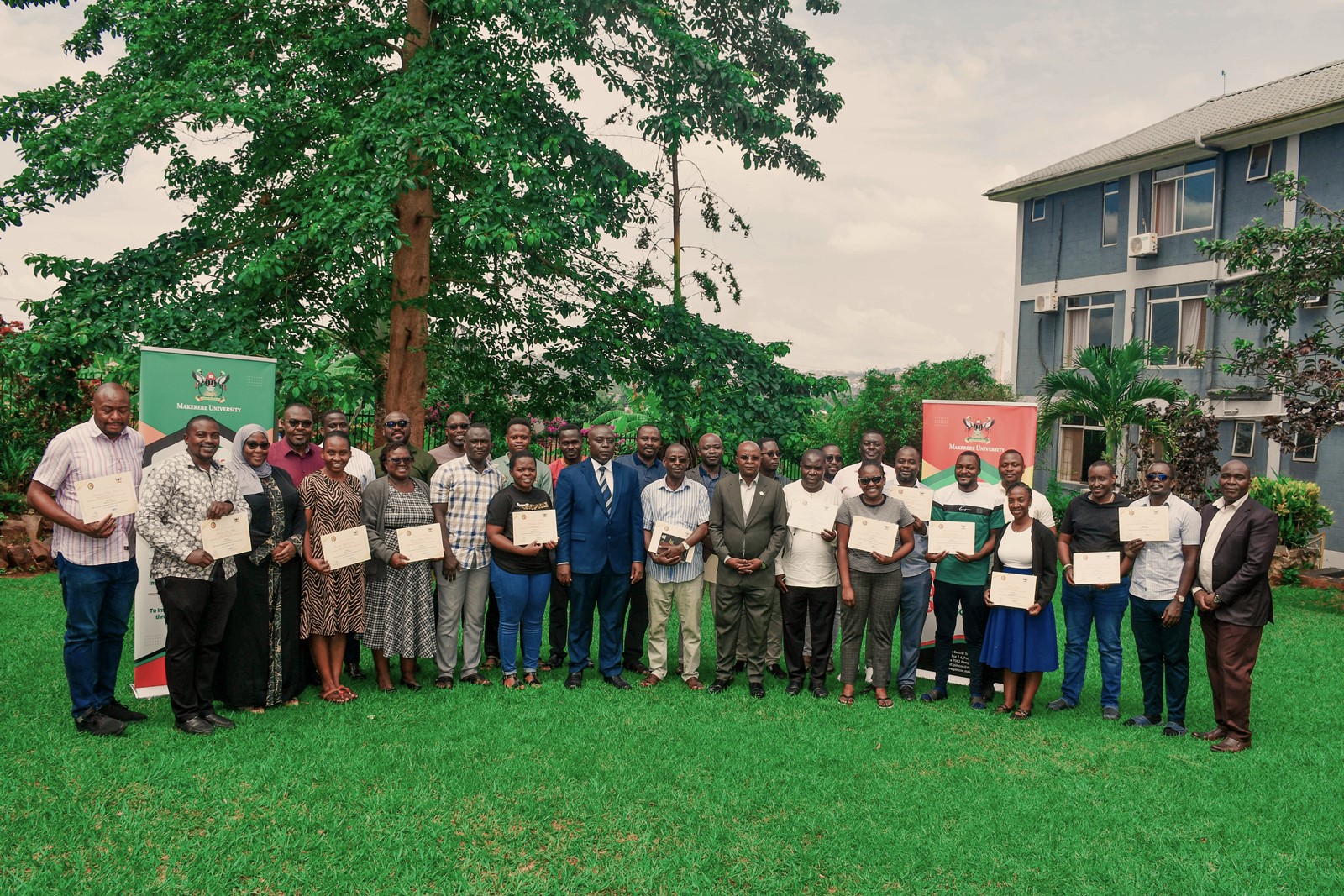
Thirty public officers from various Ministries, Departments and Agencies (MDAs) have successfully completed a two-week intensive training in Integrated Regulatory Cost-Benefit Analysis (IRCBA), culminating in the award of certificates at a closing ceremony held on 27th February 2026 at the Pearl on the Nile Hotel in Jinja.
The training was jointly organized by the Public Investment Management Centre of Excellence at Makerere University and the Ministry of Finance, Planning and Economic Development (MoFPED), in collaboration with the Infrastructure and Social Services Department (ISSD) and the National Planning Authority (NPA). It focused on operationalizing the Revised Guidelines for the Issuance of Certificates of Financial Implication (CFIs), which came into effect on 1st July 2025.
A Strategic Reform for Fiscal Credibility
In closing remarks delivered on by Commissioner Paul Patrick Mwanja behalf of the Permanent Secretary/Secretary to the Treasury, participants were commended for undertaking the training during a demanding budget cycle, when many MDAs are simultaneously preparing the FY 2026/27 Budget, executing the FY 2025/26 Budget, and implementing the National Development Plan IV and the Tenfold Growth Strategy.
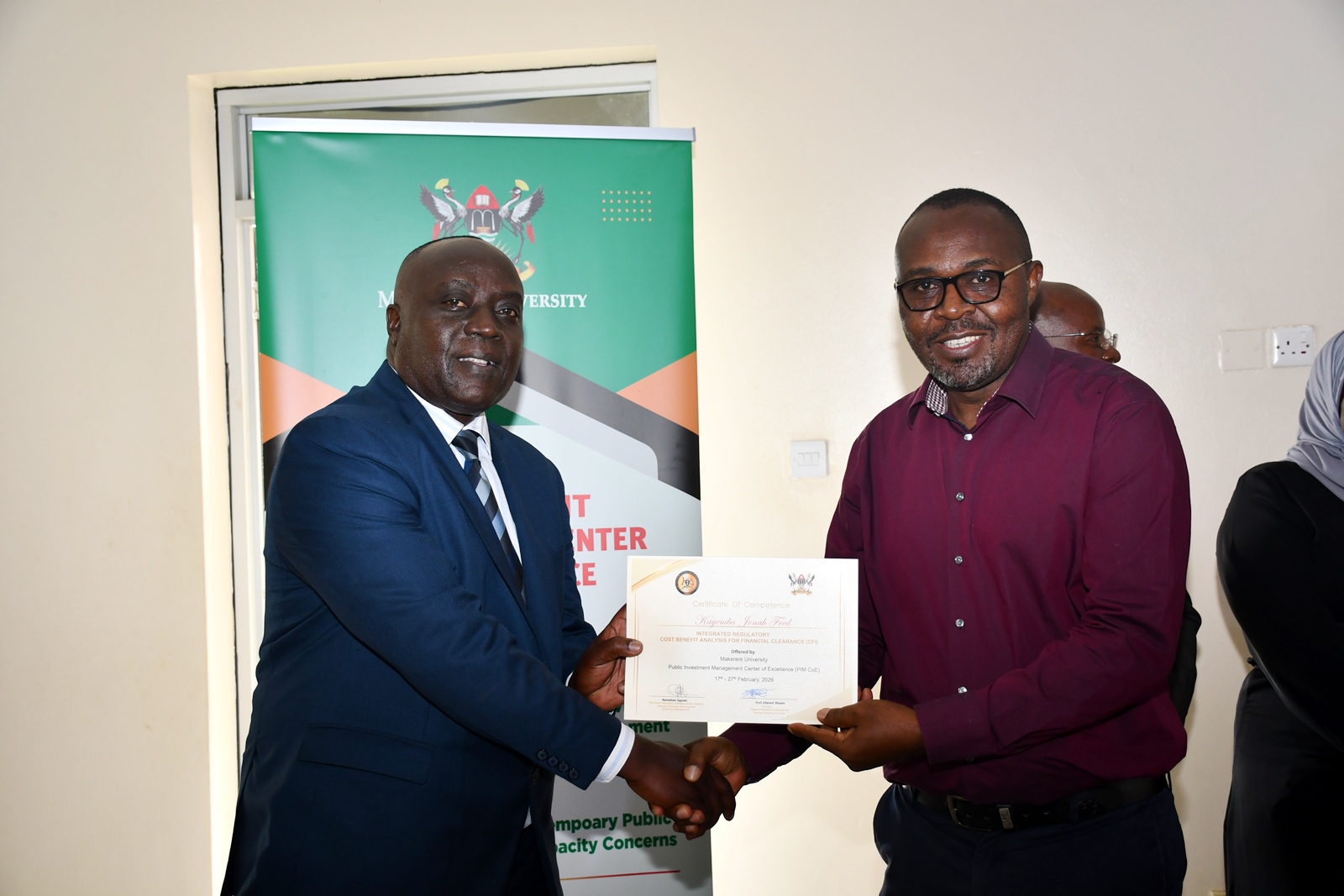
The PS/ST emphasized that the revised Guidelines mark a significant shift toward a more transparent, data-driven, consultative, and analytically rigorous approach to evaluating policy and legislative proposals. Participants were equipped to assess fiscal implications, evaluate economic and socio-economic impacts, analyze distributional effects, and address uncertainty using structured analytical tools.
They were reminded that training alone is not sufficient, the real test lies in consistent application. As members of the third cohort, they were challenged to serve as reform ambassadors, championing evidence-based policymaking and strengthening analytical standards across government.
Bridging Academia and Public Service
Delivering the official closing remarks, the Director of the PIM Centre of Excellence, Prof. Edward Bbaale, commended participants for their active engagement and unwavering commitment throughout the training.
He described the programme as both timely and strategic, designed to equip officers with practical tools to prepare robust Statements of Financial Implication (SFIs) that support credible issuance of CFIs. He noted that strong financial analysis enhances fiscal discipline, policy coherence, and the overall quality of legislation and public policy in Uganda.
Prof. Bbaale underscored the longstanding partnership between Makerere University and the Ministry of Finance, highlighting how it continues to bridge academia and public service by combining analytical rigor with practical policy experience. He emphasized that the collaborative model — bringing together faculty from the College of Business and Management Sciences and practitioners from Government, reflects the core vision of the PIM Centre of Excellence: strengthening national systems through evidence-based policymaking.
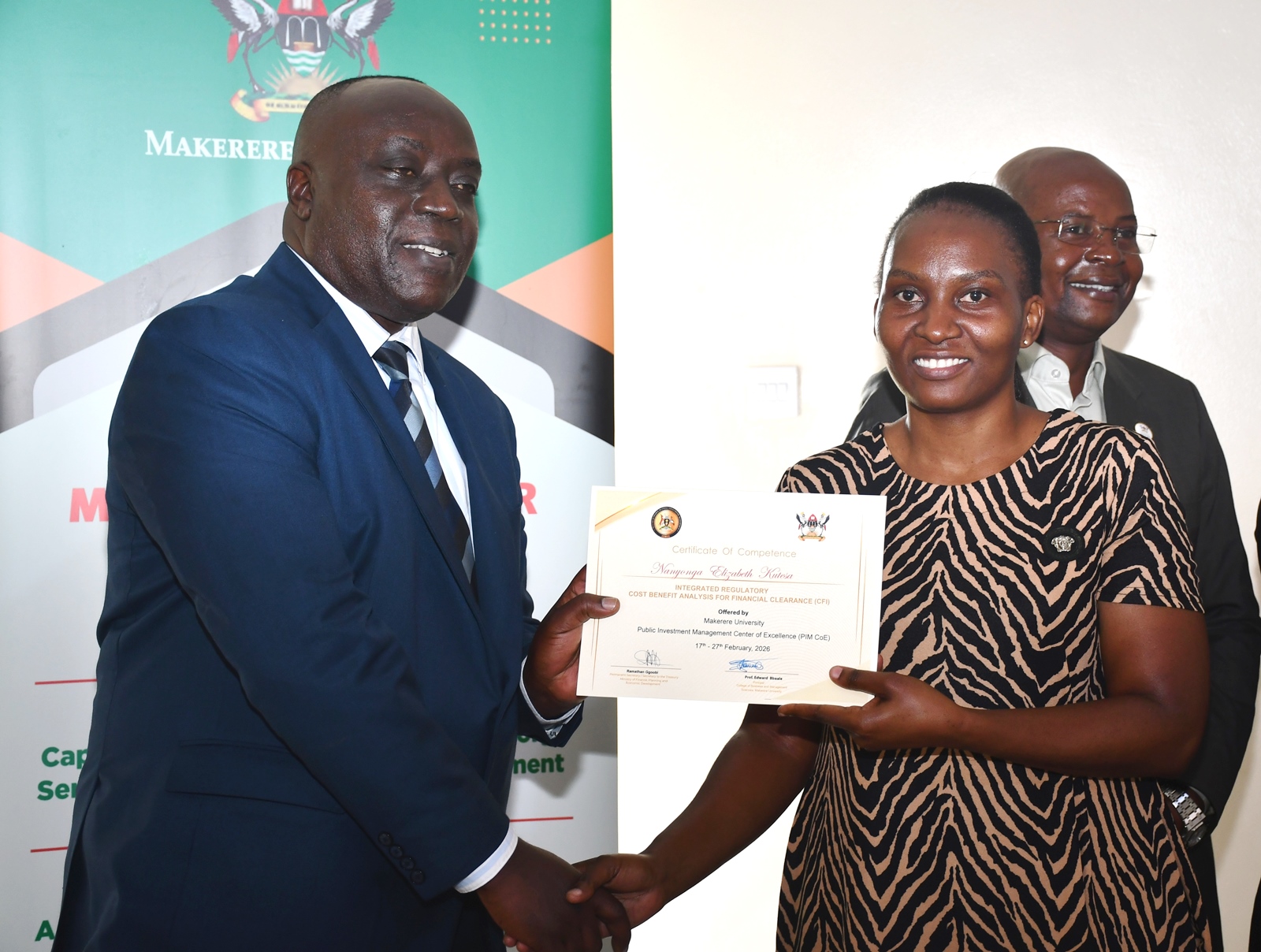
During the two weeks, participants gained hands-on experience in applying cost-benefit analysis across four critical dimensions: budgetary analysis, socio-economic analysis, distributive impacts, and risk assessment. Prof. Bbaale encouraged them to return to their institutions as agents of transformation, improving evaluation frameworks, strengthening regulatory decisions, and ensuring that public interventions deliver value for money and long-term development impact.
He also reaffirmed the Centre’s broader mandate beyond training, noting its recent support to the revision of Development Committee Guidelines, assessment of public investment performance since NDP I, and hosting of the Second Public Investment Management Conference in August 2025.”
Building from “Zero Kilometre”
Earlier, the Manager of the PIM Centre of Excellence highlighted the practical approach adopted during the training. Participants began with blank Excel sheets and built analytical models from scratch, likened to the engineering concept of starting at “zero kilometre,” where construction begins from the very starting point and progresses step by step.
The interactive sessions enabled participants from diverse disciplines, including policy analysts, planners and statisticians, to interrogate assumptions, refine costing approaches, and debate implementation and enforcement frameworks. Their sector-specific insights enriched the learning process and strengthened the analytical models developed.
The Manager noted that excellence is not about knowing everything, but about bringing together the right expertise. Facilitators from MoFPED, NPA, the Office of the President, and Makerere University ensured that theory remained grounded in practical government realities.
Participants Applaud Practical and Engaging Sessions
Speaking on behalf of the cohort, a participant described the training as highly engaging and transformative. The combination of theory and practical application, coupled with patient facilitation, allowed officers from varied professional backgrounds to learn from one another.
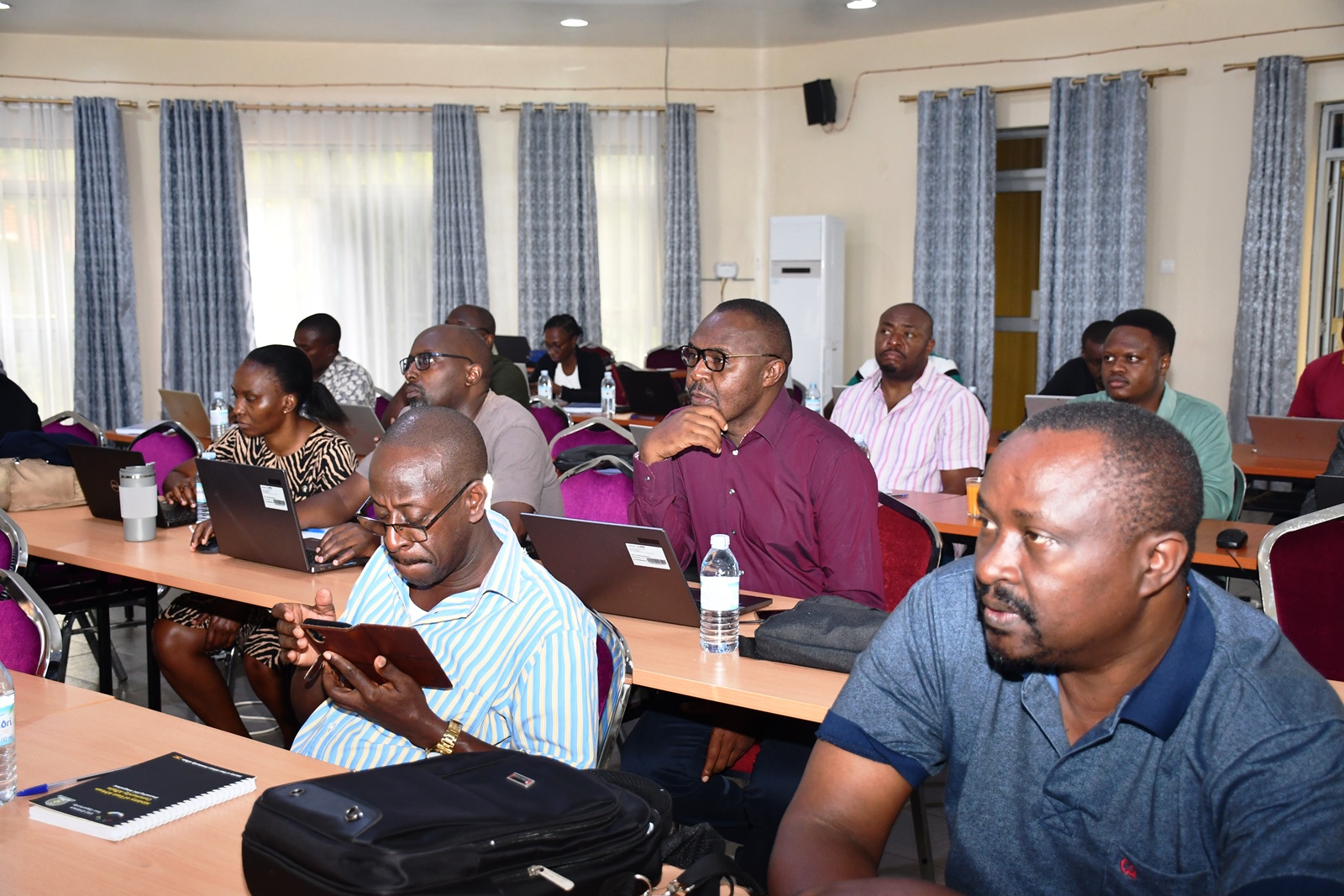
The participant highlighted the final day’s discussions as the most impactful, expressing confidence that the knowledge gained would enhance policy analysis and improve the quality of programmes and projects across MDAs.
Certificates Awarded
The ceremony concluded with the award of certificates to all 30 participants in recognition of their successful completion of the IRCBA training. The certification marks another milestone in Government’s effort to build a critical mass of experts capable of institutionalizing rigorous financial and economic analysis in public policy processes.
As the workshop was formally declared closed, participants were encouraged to apply their newly acquired skills consistently, mentor colleagues, and contribute to strengthening fiscal governance across Government.
The PIM Centre of Excellence reaffirmed its commitment to continuous research, policy advisory support, and capacity building as Uganda advances toward more credible, transparent, and sustainable public decision-making.
Business & Management
Botswana Delegation Visits Makerere’s Public Investment Management Centre to Study Sustainable Training Model
Published
2 days agoon
March 3, 2026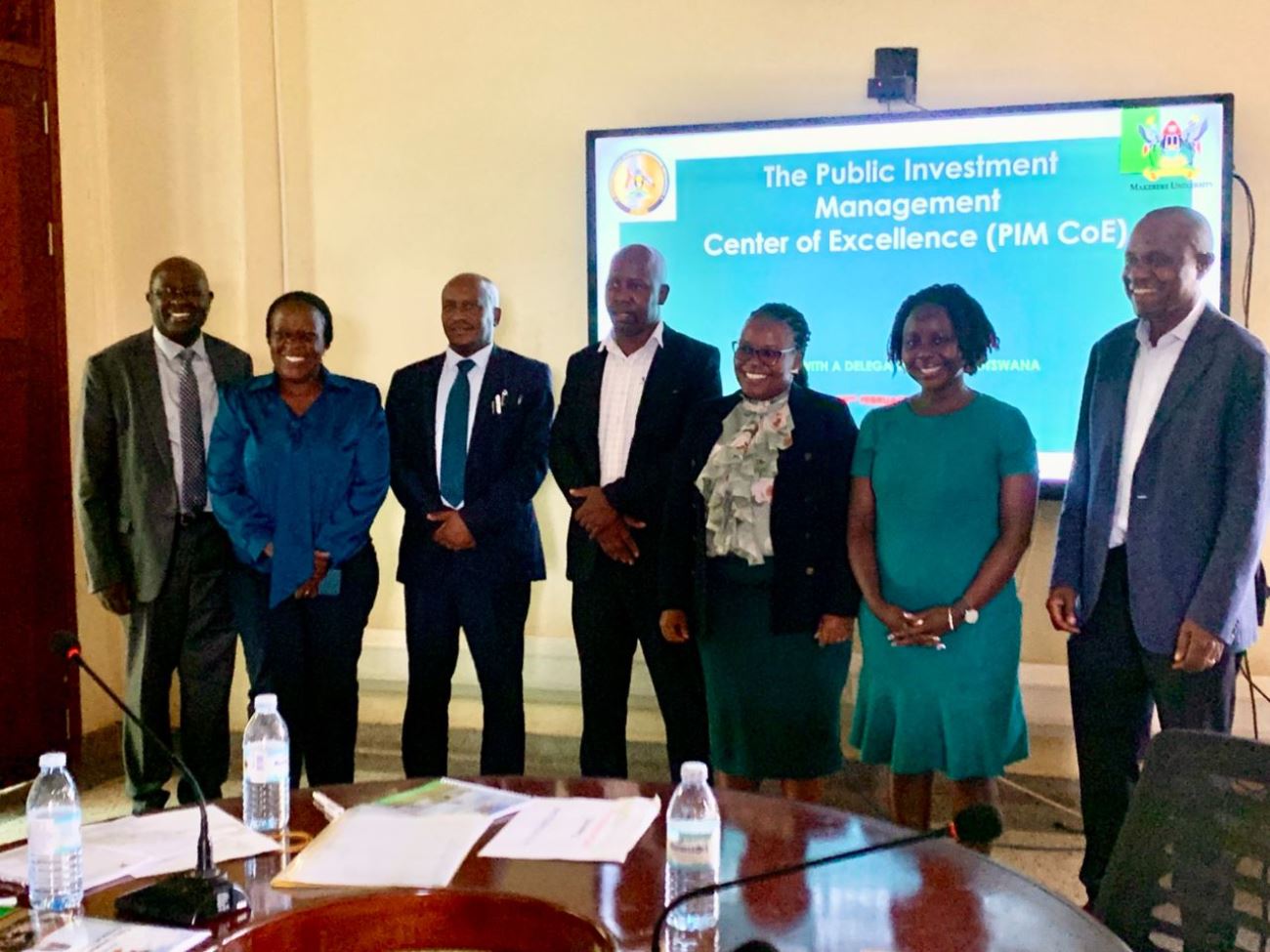
Kampala, Uganda – 25 February 2026
A delegation from Botswana’s public investments sector on 25th February 2026 visited Makerere University’s Public Investment Management Centre of Excellence to benchmark its sustainable training model and draw lessons from Uganda’s well-established Public Investment Management (PIM) framework.
The team, composed of specialists in public investments, is exploring ways to strengthen capacity within Botswana’s public sector institutions. The delegation underscored the importance of structured and sustainable capacity-building programmes, noting that effective public investment management is central to driving national development and ensuring value for money in public projects.
During the engagement, the Botswana team sought to understand the Centre’s operational model, including how it designs and delivers training programmes that remain impactful over time. Particular interest was placed on the Centre’s approach to sustainable training delivery, the documentation of challenges and successes, and mechanisms used to ensure that public officers acquire long-term, practical skills that translate into improved project planning, appraisal, and implementation.
The visiting delegation commended Uganda’s commitment to institutionalizing PIM training and emphasized that cross-country learning is vital for strengthening public financial management systems across Africa. They observed that Uganda’s experience offers practical insights into building a resilient and responsive PIM framework anchored in continuous professional development.
As part of their recommendations, the delegation proposed the introduction of a hybrid training model to enhance accessibility for international participants. Under this approach, the theoretical components of PIM courses would be delivered online, allowing participants to engage remotely from Botswana and other countries. This would then be followed by in-person sessions in Uganda focused on hands-on, experiential learning at the Centre.
According to the delegation, such a model would significantly reduce travel costs and time while preserving the value of face-to-face practical training. The hybrid approach would also provide flexibility for busy public officers, enabling them to balance professional responsibilities with structured learning.
The visit further strengthened regional collaboration and reaffirmed the role of Uganda’s Public Investment Management Centre of Excellence as a hub for capacity development in public investment management across the continent.
Business & Management
76th Graduation Ceremony: CoBAMS Staff and Graduates Win Excellence Awards
Published
1 week agoon
February 26, 2026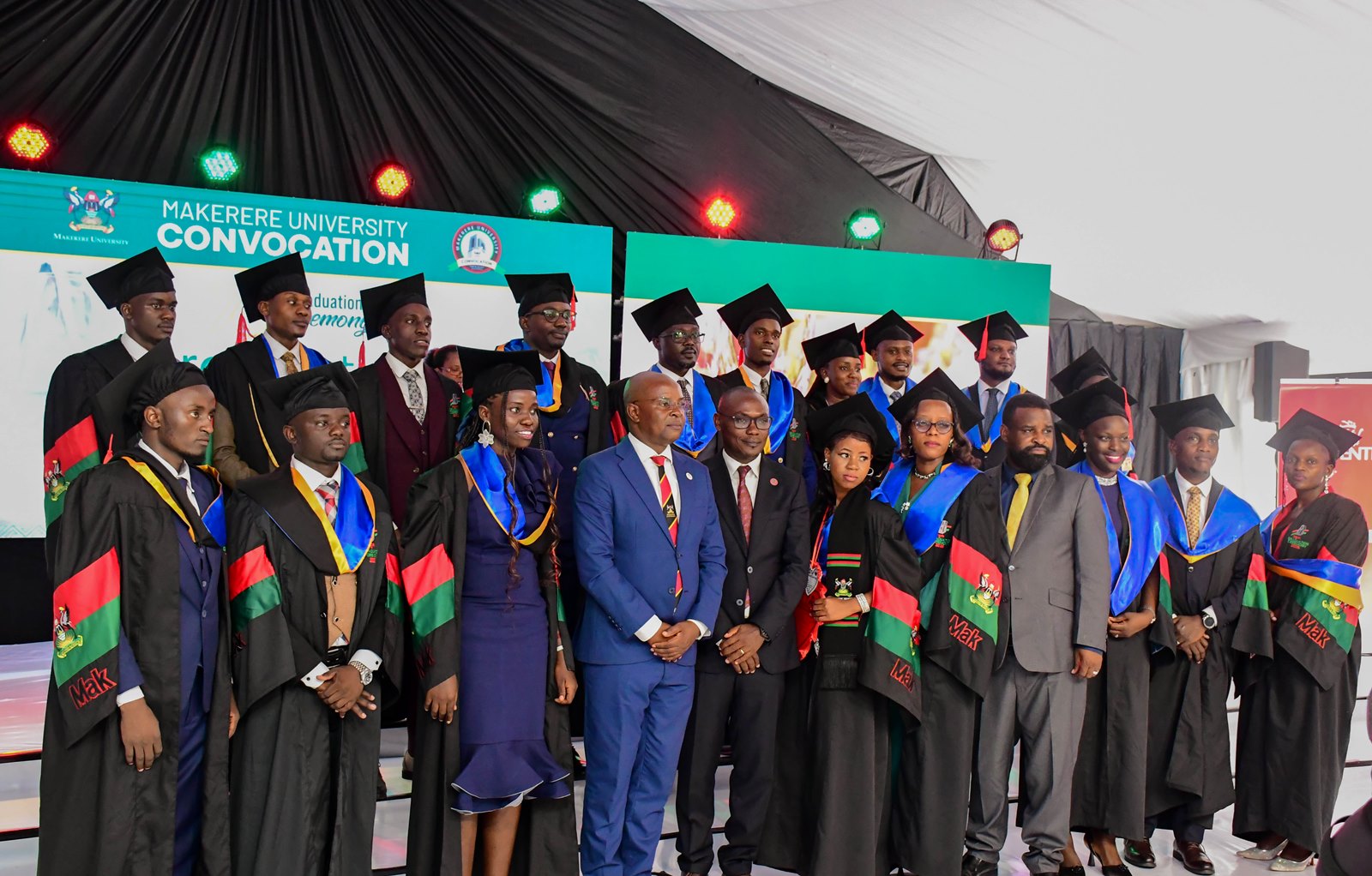
26th February 2026-During the 76th Graduation Ceremony (24th to 27th February 2026), Makerere University invoked its tradition of recognizing outstanding performance and excellence in academics, research, teaching, knowledge transfer, publication and authorship.
The College of Business and Management Sciences (CoBAMS) presented students for graduation on the third day of the 76th graduation ceremony. Consequently, on 26th February 2026, entities within the University namely the Office of the Vice Chancellor, Makerere University Press, the Directorate of Research, Innovations and Partnerships, Directorate of Graduate Training, and partners including the Economic Policy and Research Centre (EPRC), Association of Chartered Certified Accountants (ACCA Uganda), Prudential Uganda, lined up awards, to celebrate achievements and excellence.
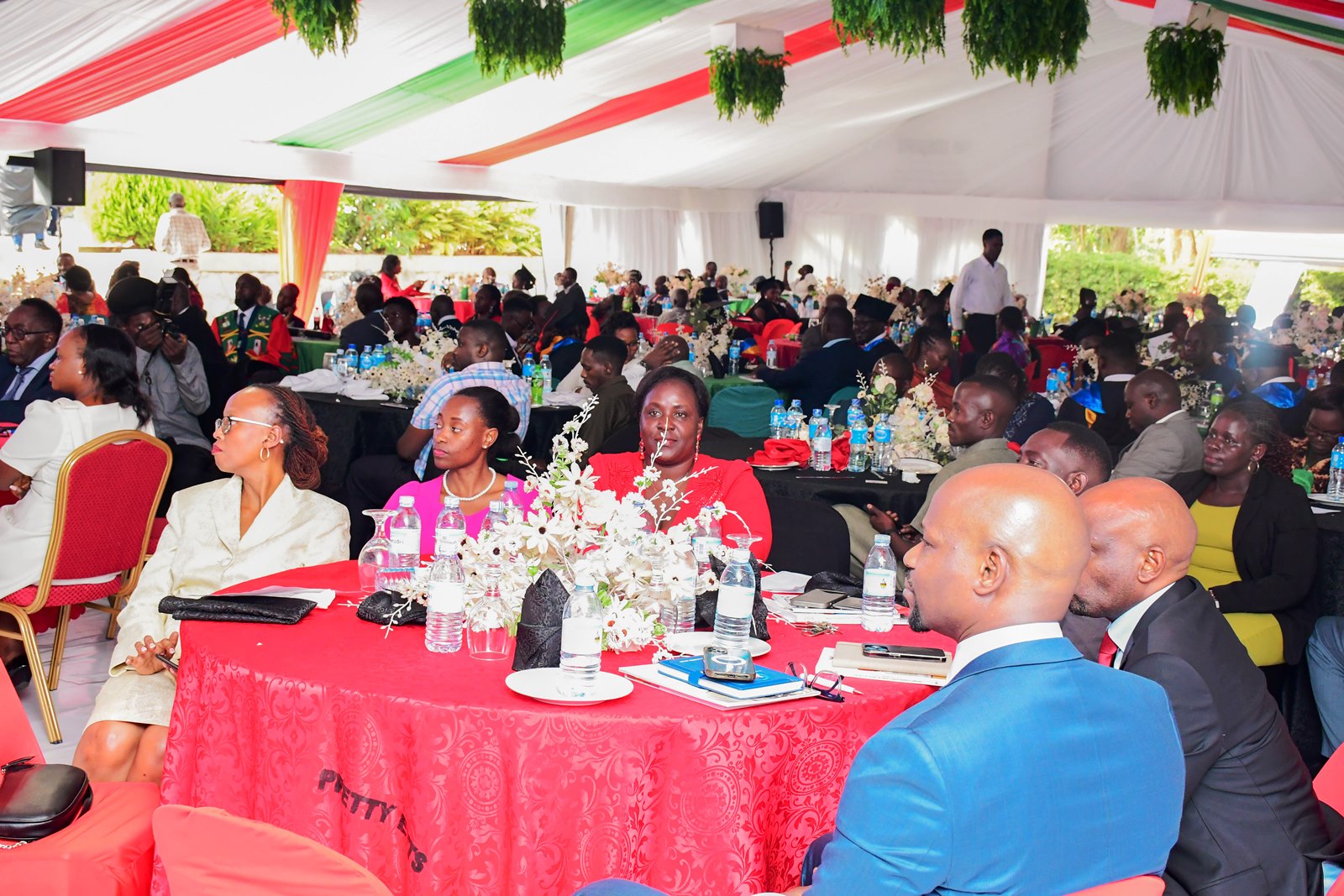
The award ceremony brought onboard invited guests from public and private sectors, the business community, Makerere University officials, faculty members, alumni, industry partners and graduating students. The awards were presented during the Makerere University Convocation Graduation Luncheon.
The ceremony provided a platform for celebrating academic excellence, strengthening alumni engagement, and reinforcing collaboration between the University and its professional and industry partners.
2026 Research Excellence Awards
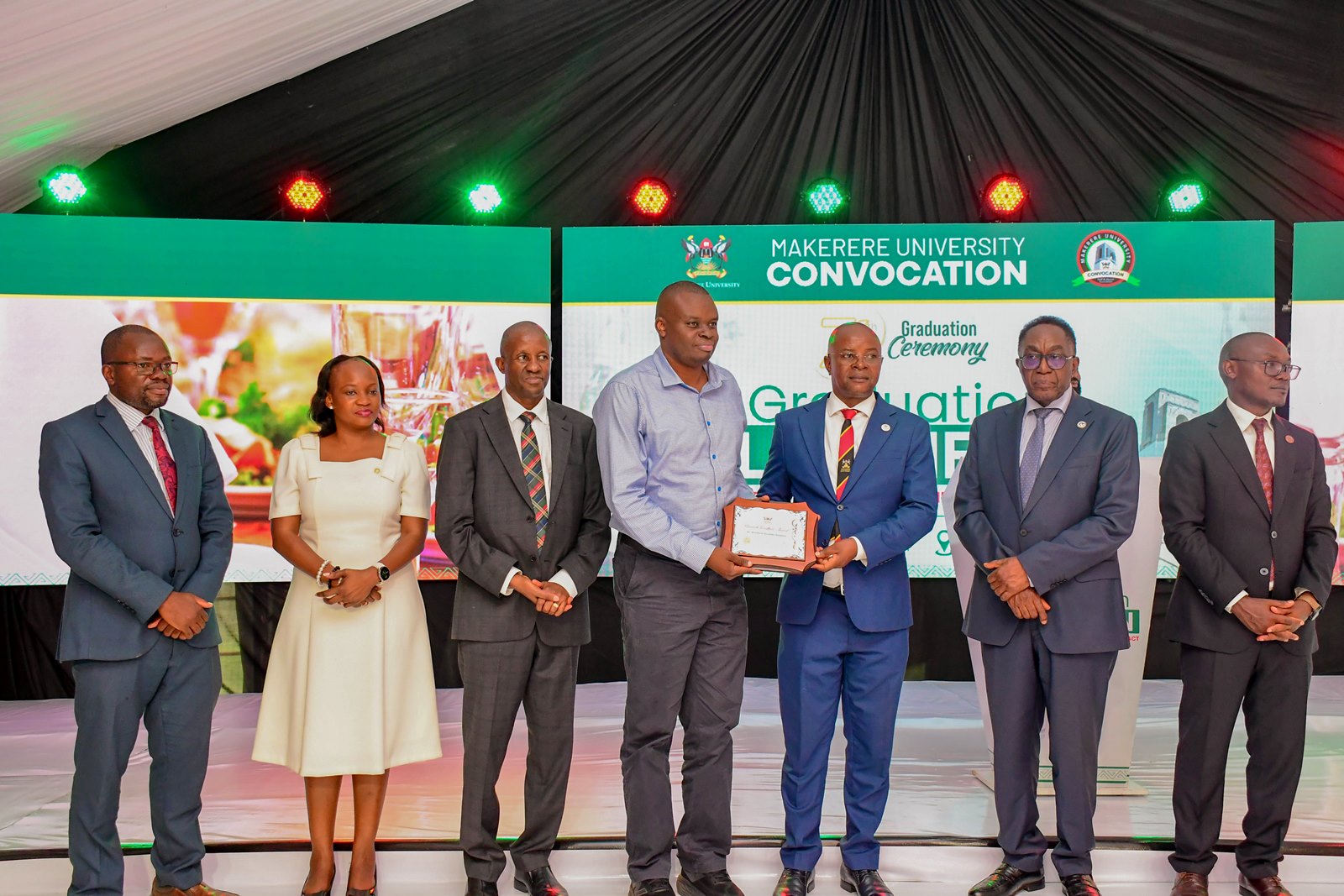
The Vice Chancellor’s Research Excellence Awards were presented to college members whose research output and scholarly contributions have significantly advanced knowledge and strengthened the College’s academic profile.
At CoBAMS, the recipients of the Vice Chancellor’s Research Excellence Awards in the various categories included the following:
- Associate Professor Faisal Buyinza, Overall top research award
- Associate Professor Faisal Buyinza, Senior-Career Research award
- Stephen Ojiambo Wandera, Mid-Career Research award
- Ruth Mpirirwe and Richard Ssempala, Early-Career Research award
The awardees were honored for their exceptional research productivity, impactful publications, and contribution to building a vibrant research culture.
The awards underscore Makerere University’s emphasis on high-quality research that addresses national and global development challenges.
Recognition of Book Author
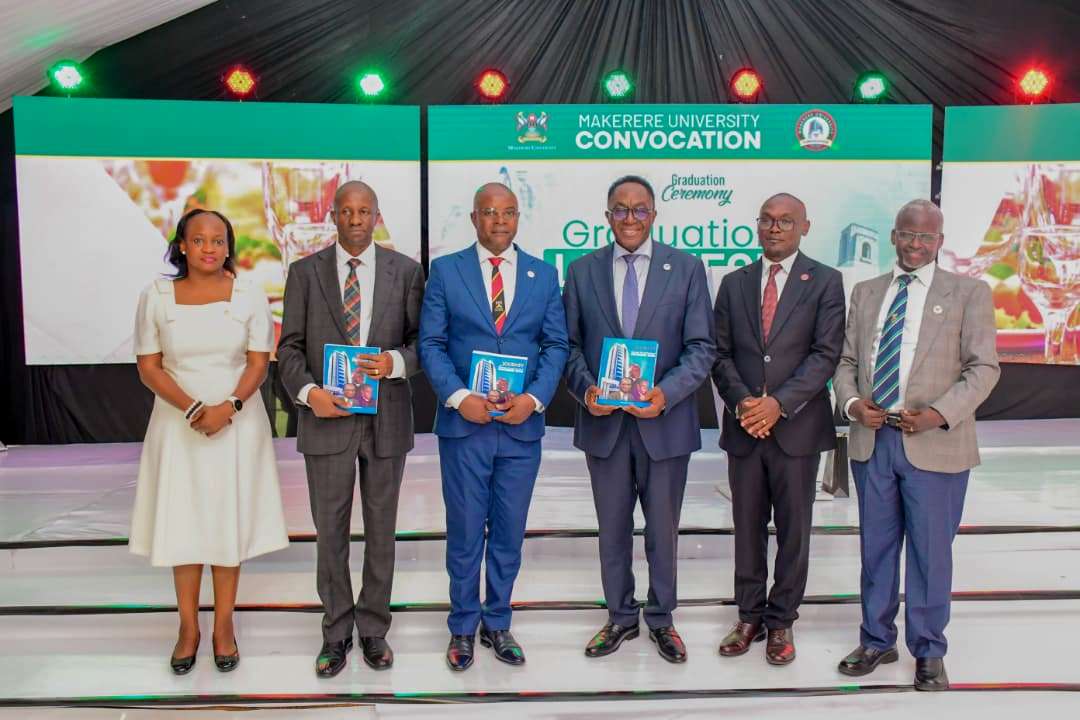
Prof. John Ddumba-Ssentamu, a renowned economist, administrator, former Vice Chancellor of Makerere University, and the pioneer Principal of the College of Business and Management Sciences, was honoured for his contribution to scholarship and knowledge transfer through authorship.
Published by Makerere University Press, Prof. Ddumba-Ssentamu’s book titled, The Journey: Beginnings, Trials and Triumphs of Centenary Bank, highlights the evolution, resilience, and growth of Centenary Bank and reflects his continued contribution to academic literature and thought leadership in the fields of economics and financial development.
Prof. Ddumba-Ssentamu’s recognition reflects the University’s appreciation of distinguished scholars whose published works contribute to intellectual discourse, policy engagement, and the advancement ofscholarship.
Reputable partners recognize excelling graduates
ACCA Uganda- Best Accounting Student
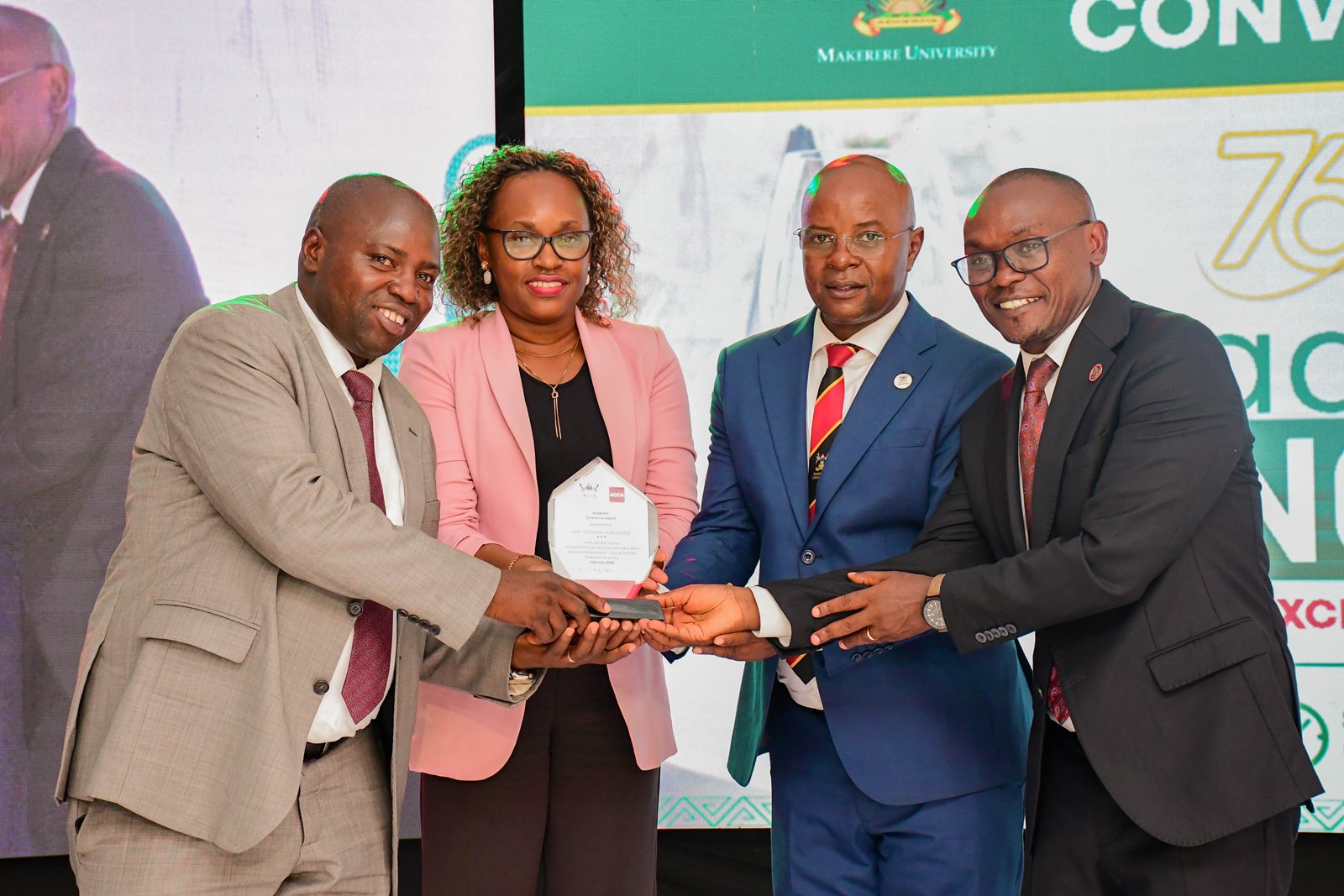
Prudential Uganda-Actuarial Science Award
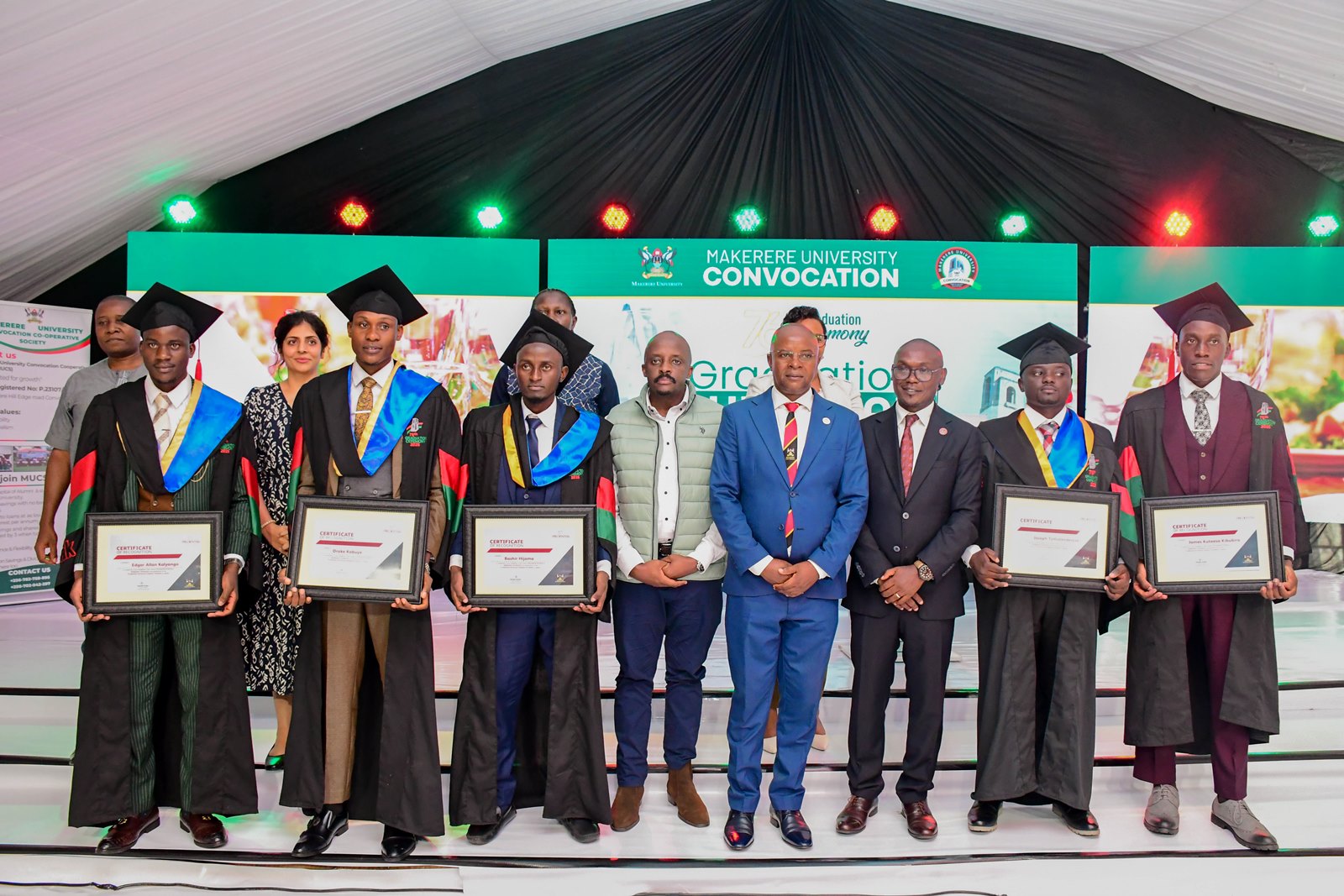
Celebrating academic excellence, Prudential Uganda recognized the fourth cohort of outstanding actuarial science graduates under the Prudential Actuarial Science Support Scheme (PASS). The initiative reflects Prudential’s long-term commitment to building local actuarial expertise and strengthening Uganda’s financial services sector for generations to come.
The top five graduates of Bachelor of Science in Actuarial Science who received the PASS awards included: Drake Kabuye, Edgar Allan Kalyango, Kuteesa Kikubira James, Tumutendereze Joseph, and Bashir Hijoma. These were honored for their outstanding academic performance and commitment to actuarial career. Through PASS, Prudential Uganda provides high-potential graduates with mentorship, internship opportunities, and guidance toward globally recognized actuarial qualifications.
Commenting on the milestone, Tetteh Ayitevie, CEO of Prudential Uganda, said that investing in actuarial talent is critical to building a resilient and sustainable financial services industry. He noted that actuaries play a central role in risk management, pricing, product development, and long-term financial planning, making their contribution vital to the growth of Uganda’s insurance sector.
Prof. Edward Bbaale, the Principal, College of Business and Management Sciences, applauded Prudential Uganda for its ongoing support, highlighting that programmes such as PASS inspire students to excel academically while preparing them for the realities and demands of the actuarial profession.
EPRC Young Professional Award
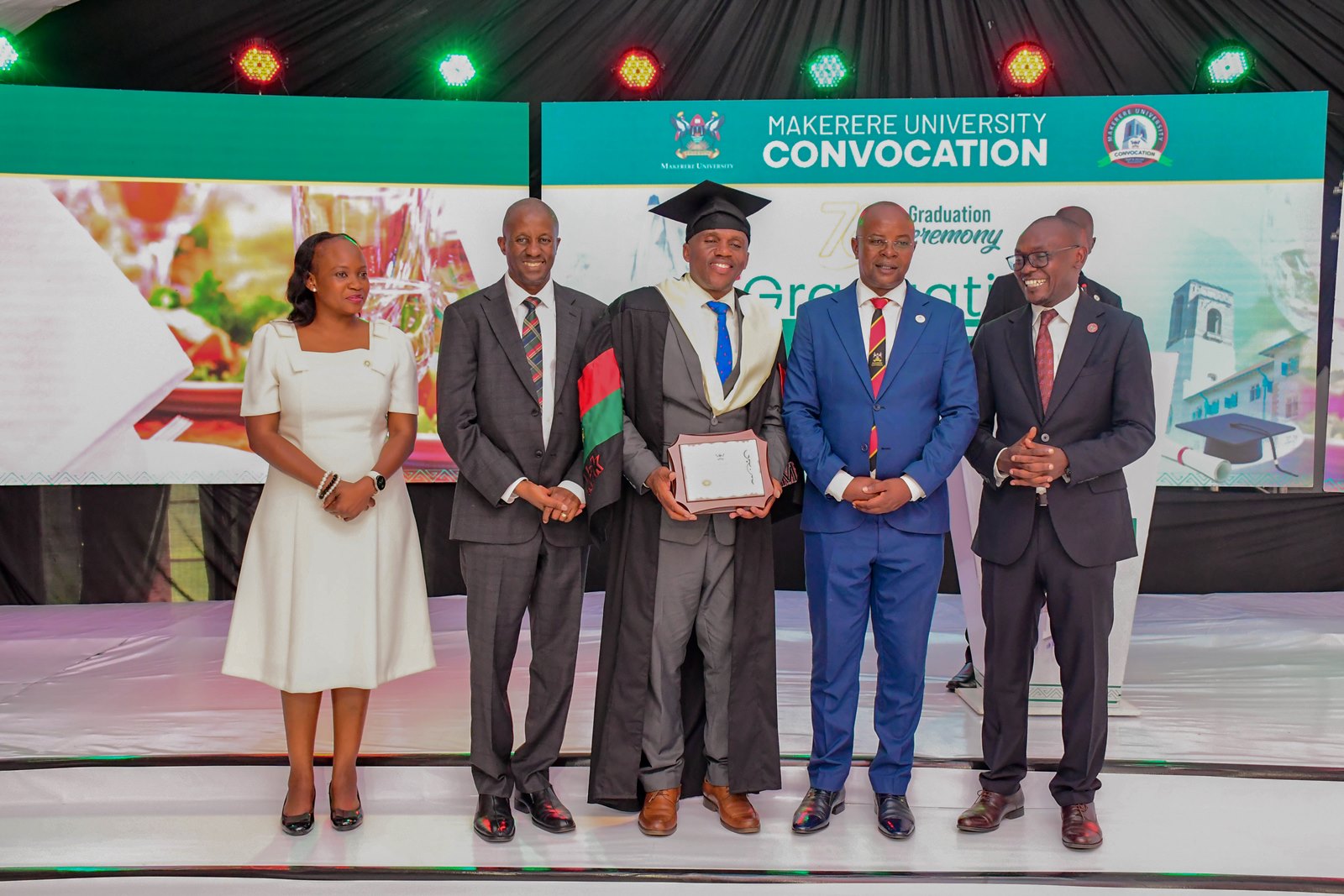
Recognizing excellence, EPRC presented the Young Professional award to Emmanuel Menya, the best Master of Arts in Economics graduate. The award includes a two-year employment contract. Ibrahim Kasirye, the Director of Research at EPRC presented the award on behalf of Dr. Sarah Ssewanyana, the Executive Director.
The EPRC Young Professional Award, recognizes and celebrates exemplary performance. The award underscores the importance of nurturing young professionals who exhibit excellence, innovation, and a strong commitment to national development.
Significance of the Award ceremony
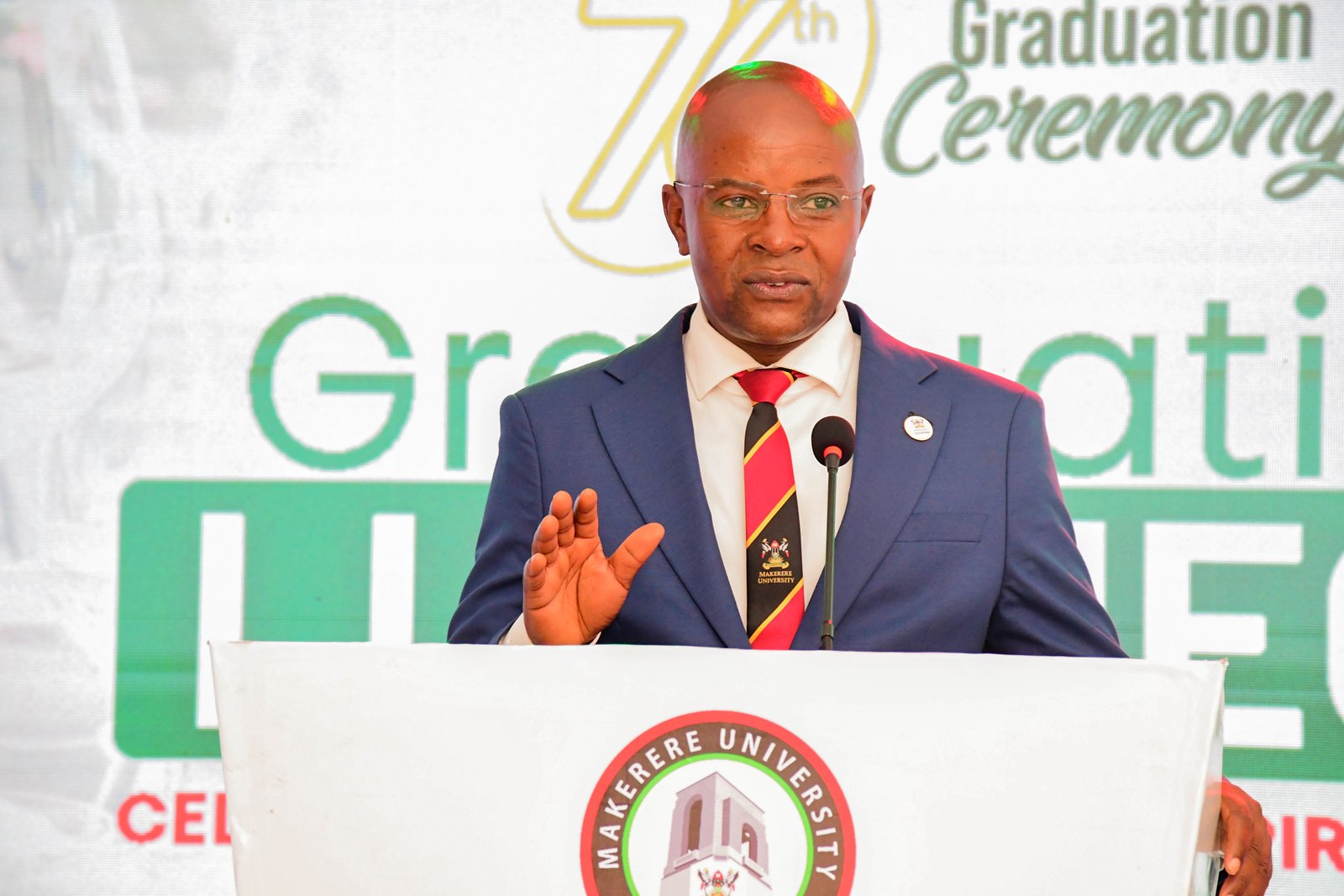
Prof. Edward Bbaale, Principal of College of Business and Management Sciences (CoBAMS), underscored the significance of the ceremony, noting that it served three key purposes: to recognize academic excellence among students, to honor faculty members excelling in teaching, research, and service, and to celebrate Prof. John Ddumba-Ssentamu, former Vice-Chancellor of Makerere University, for his continued contribution to scholarship through authorship.
Prof. Bbaale described Prof. Ddumba-Ssentamu’s ongoing scholarly work as inspirational, stating that it demonstrates a steadfast commitment to knowledge creation beyond leadership roles. He commended both students and staff for their hard work and discipline, emphasizing that university success is a shared achievement.
Collaboration, Responsibility, and Excellence
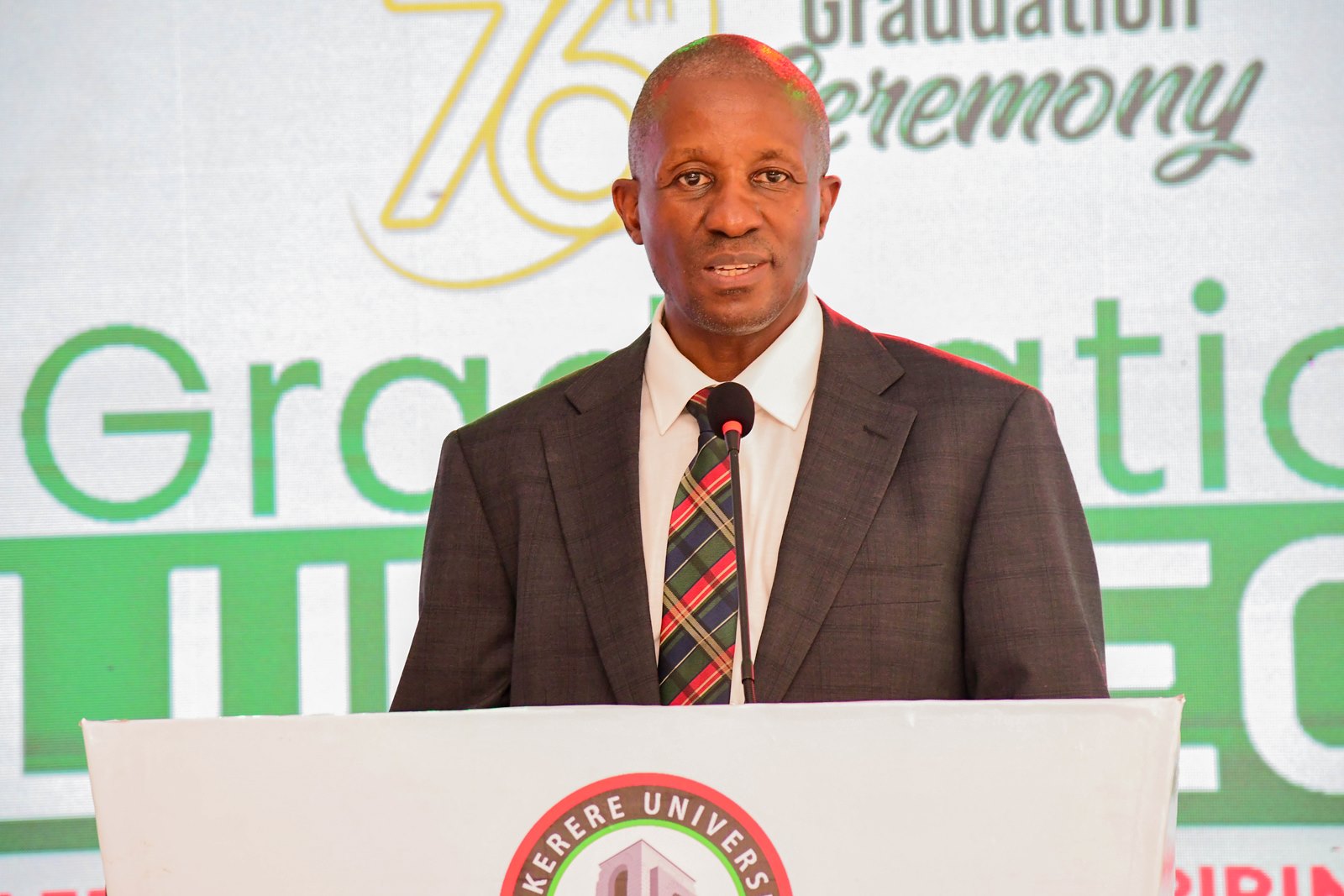
Congratulating the awardees, the Principal of Makerere University Business School (MUBS), Prof. Moses Muhwezi, reminded graduates that being a product of Makerere University is both a privilege and a responsibility.
“Uphold the university’s internationally respected brand, defend it, and take pride in it, while maintaining unity and avoiding internal conflicts that could harm its reputation,” he urged. The Principal of MUBS encouraged graduates to remain committed, diligent, and focused in their pursuit of excellence.
Highlights about Makerere University Convocation
CPA George Mugabi Turyamureeba, Chairperson of the Makerere University Convocation, informed the audience, that the Convocation is a legally established and influential platform for alumni and staff.
Rallying alumni and staff to join Makerere University Convocation, CPA Turyamureeba outlined the achievements and ongoing activities. He reported that during his tenure, the Convocation Executive, had expanded and beautified the permanent home for the Convocation. Some of the ongoing activities include: strengthening alumni engagement, introduction of a cross-generational mentorship program, and the formation of a cooperative society (SACCO) aimed at providing affordable loans and potentially establishing a bank.
He tipped the fresh graduates on resilience, continuous self-improvement, and lifelong learning, stressing the importance of staying connected to their alma mater and the Makerere University Convocation community.
He cautioned the graduates on emerging fraud risks, including digital scams, and fraudulent job offers. He urged them to safeguard their personal information, uphold integrity, and avoid becoming either victims or perpetrators of fraud.
Trending
-

 General17 hours ago
General17 hours agoCall for Applications: Diploma Holders under Government Sponsorship 2026/2027
-

 General17 hours ago
General17 hours agoAdvert: Admissions for Diploma/Degree Holders under Private Sponsorship 2026/27
-

 Humanities & Social Sciences2 weeks ago
Humanities & Social Sciences2 weeks agoMeet Najjuka Whitney, The Girl Who Missed Law and Found Her Voice
-

 General1 week ago
General1 week ago76th Graduation Highlights
-

 Agriculture & Environment2 weeks ago
Agriculture & Environment2 weeks agoUganda Martyrs Namugongo Students Turn Organic Waste into Soap in an Innovative School Project on Sustainable Waste Management
